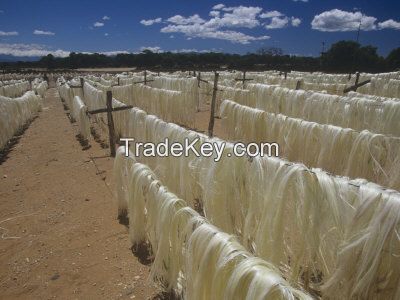

Prix FOB
Obtenir le dernier prix|
16 Metric Ton Minimum Order
Pays:
South Africa
N ° de modèle:
-
Prix FOB:
Localité:
Kenya/ Tanzania
Prix de commande minimale:
-
Commande minimale:
16 Metric Ton
Packaging Detail:
sisal/dyed twine Ply: 1pls, 2ply, 3ply Weight: 100g/pc. 120g/pc200g/pc, Packing; 100pcs/ctn, 200pcs/
Heure de livraison:
Prompt
Capacité de Fournir:
1000 Metric Ton per Week
Payment Type:
T/T
Groupe de produits :
-
South Africa
Personne à contacter Mr. Gio
150 Commissioner Street, Johannesburg, Gauteng
Sisal Fiber is one of the most widely used natural fiber and is
very easily cultivated. It is obtain from sisal plant. The plant,
known formally as Agave sisalana. These plants produce rosettes of
sword-shaped leaves which start out toothed, and gradually lose
their teeth with maturity. Each leaf contains a number of long,
straight fibers which can be removed in a process known as
decortication. During decortication, the leaves are beaten to
remove the pulp and plant material, leaving the tough fibers
behind. The fibers can be spun into thread for twine and textile
production, or pulped to make paper products.
Sisal fiber is fully biodegradable, green composites were
fabricated with soy protein resin modified with gelatin. Sisal
fiber, modified soy protein resins, and composites were
characterized for their mechanical and thermal properties. It is
highly renewable resource of energy. Sisal fibre is exceptionally
durable and a low maintenance with minimal wear and tear. Its fibre
is too tough for textiles and fabrics. It is not suitable for a
smooth wall finish and also not recommended for wet areas.
The fine texture of Sisal takes dyes easily and offers the largest
range of dyed colours of all natural fibres. Zero pesticides or
chemical fertilisers used in sisal agriculture. It is a stiff fiber
traditionally used in making twine, rope and also dartboards Sisal
fiber is manufactured from the vascular tissue from the sisal plant
(Agavesisalana). It is used in automotive friction parts (brakes,
clutches), where it imparts green strength to performs, and for
enhancing texture in coatings application.
Properties of Sisal Fiber:
Sisal Fiber is exceptionally durable with a low maintenance with
minimal wear and tear.
It is Recyclable.
Sisal fibers are obtained from the outer leaf skin, removing the
inner pulp.
It is available as plaid, herringbone and twill.
Sisal fibers are Anti static, does not attract or trap dust
particles and does not absorb moisture or water easily.
The fine texture takes dyes easily and offers the largest range of
dyed colours of all natural fibers.
It exhibits good sound and impact absorbing properties.
Its leaves can be treated with natural borax for fire resistance
properties.
Chemical Composition of Sisal Fiber:
Cellulose: *5%
Hemicelluloses: *2%
Lignin: 9.9%
Waxes: 2%
Total: **0%
Uses/Application of Sisal Fiber:
From ancient times sisal has been the leading material for
agricultural twine because of its strength, durability, ability to
stretch, affinity for certain dyestuffs, and resistance to
deterioration in saltwater.
Sisal is used commonly in the shipping industry for mooring small
craft, lashing, and handling cargo.
It is also surprisingly used as the fibre core of the steel wire
cables of elevators, being used for lubrication and flexibility
purposes. Traditionally sisal was the leading material for
agricultural twine or baler twine. Although this has now been
overtaken by polypropylene.
It is used in automobile industry with fiberglass in composite
materials.
Other products developed from sisal fiber include spa products, cat
scratching posts, lumbar support belts, rugs, slippers, cloths and
disc buffers.
Sisal is used by itself in carpets or in blends with wool and
acrylic for a softer hand.
| Pays: | South Africa |
| N ° de modèle: | - |
| Prix FOB: | Obtenir le dernier prix |
| Localité: | Kenya/ Tanzania |
| Prix de commande minimale: | - |
| Commande minimale: | 16 Metric Ton |
| Packaging Detail: | sisal/dyed twine Ply: 1pls, 2ply, 3ply Weight: 100g/pc. 120g/pc200g/pc, Packing; 100pcs/ctn, 200pcs/ |
| Heure de livraison: | Prompt |
| Capacité de Fournir: | 1000 Metric Ton per Week |
| Payment Type: | T/T |
| Groupe de produits : | - |